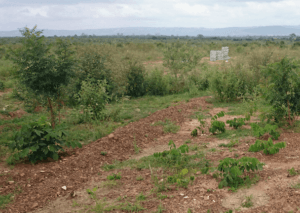Stakeholders call for expedited action to scale up tree cover in Northern Ghana
 Stakeholders at a regional dialogue have called on metropolitan, municipal, district assemblies, and civil society organizations as a matter of urgency to scale up the re- greening of the northern parts of Ghana.
Stakeholders at a regional dialogue have called on metropolitan, municipal, district assemblies, and civil society organizations as a matter of urgency to scale up the re- greening of the northern parts of Ghana.
They also called for immediate action to address land tenure challenges, indiscriminate bush fires and tree cutting, in order to increase tree cover, improve land health and livelihoods.
The stakeholders made the call at the end of a day’s workshop, organized in Bolgatanga to promote “dialogue and define practices and policies to protect trees in the landscape and to reverse land degradation, improve livelihoods and food security in the Upper East Region”.
It was organized by the World Agroforestry Centre (ICRAF) and the Centre for International Forestry Research (CIFOR), and funded by IFAD under the “West Africa Forest Farm Interface (WAFFI)project and the European Union project on “Re-greening Africa”.
The workshop was attended by farmer leaders, extension staff of the Ministry of Agriculture (MOFA), Environment and Planning Officers from three Districts, the Kassena-Nankana West, Bawku West and Garu-Tempane in the Upper East Region, the Catholic Relief Services (CRS), Tree Aid, World Vision, and the Forestry Research Institute of Ghana (FORIG).
Dr Emilie Smith Dumont, the Coordinator, West Africa Forest Farm Interface (WAFFI) for Northern Ghana and Southern Burkina Faso who shared light on the workshop, said it was to bring together diverse actors to examine ways to create synergies for resilient livelihoods among people working for transformation in the Upper East Region.
Mr Thomas Addaoh, the Field Coordinator of CIFOR, under the WAFFI project, in a presentation of a research carried out by the project, said an average content of the shea tree in bags of charcoal sampled in the region was 25.8 per cent, making the tree the most common source of wood for charcoal.
This, according to him, threatened the livelihood of rural women who formed majority of sheanut pickers and sellers as they had to compete for the shea tree products with charcoal burners and vendors.
He pointed out that the growing demand for charcoal in urban centres had culminated into increased pressure on the shea trees, which was a vital source of income for women in the north.
This requires an urgent attention to curb the looming environmental disaster and threat to livelihoods, he said.
Mr Edward Akunyagra, The Project Manager of World Vision on “Re-greening Africa”, told participants that the project was working on direct implementation of efforts to reverse tree-cover loss and was aimed at influencing policy and mindsets among stakeholders with its advocacy campaign to change behaviour.
Mr Francis Ennor, the Regional Director of MOFA, who attended the workshop with three of his District Directors, reiterated the seriousness of land degradation and continuous tree loss in the Upper East Region.
“The Land is so degraded that if you don’t apply fertilizer, either organic or inorganic, you can no longer get a good yield,” Mr Ennor said.
The Regional MoFA Director urged local authorities and communities to take tree planting and management very seriously to increase tree cover.
Source: GNA
